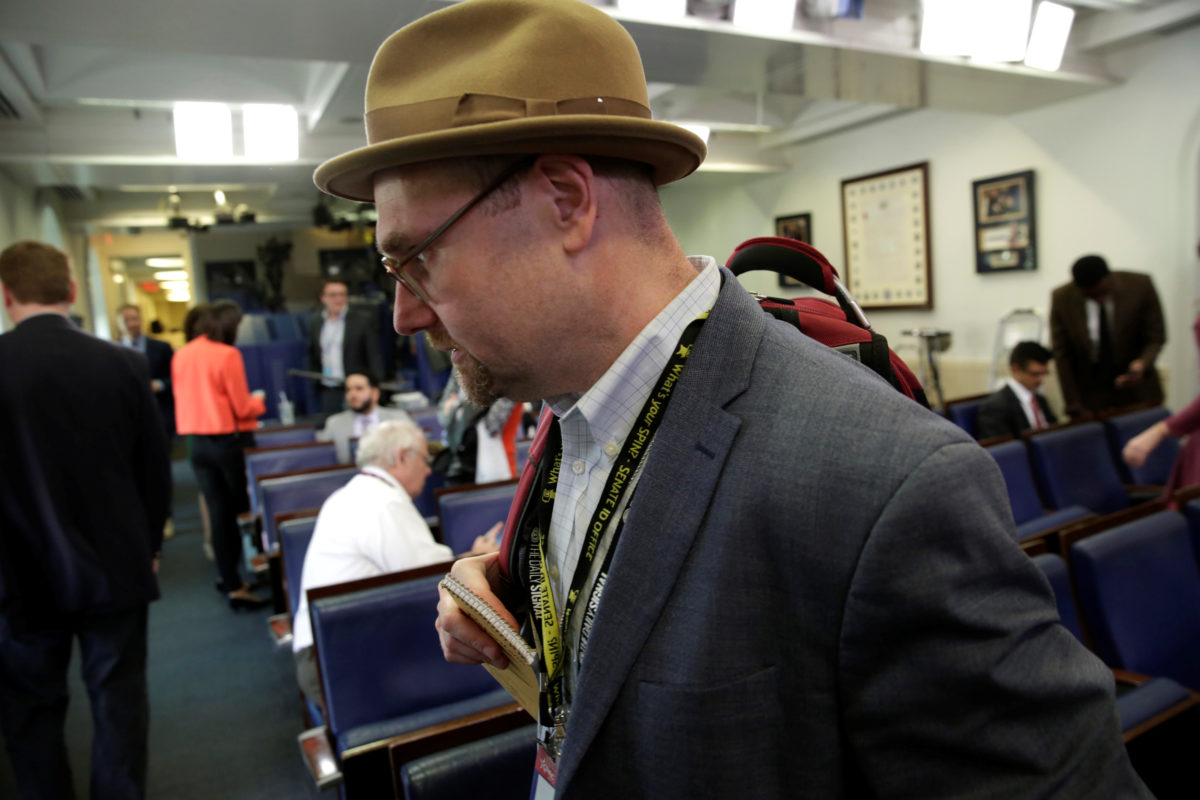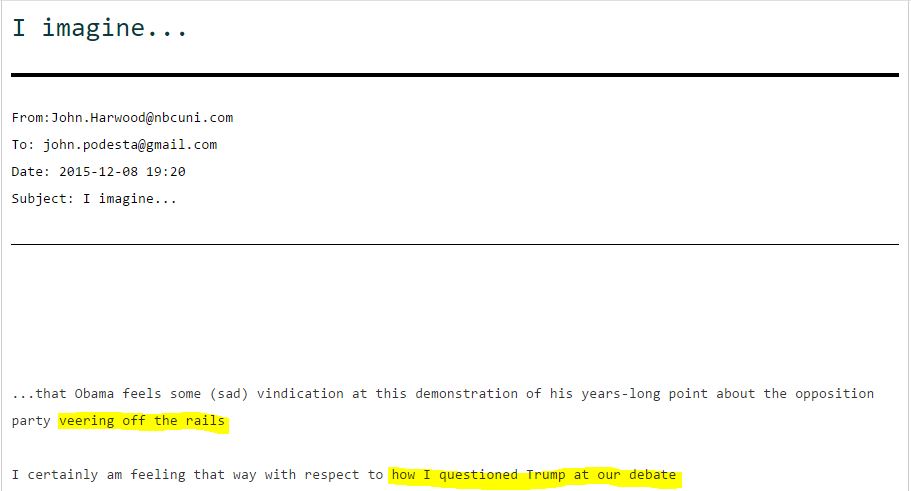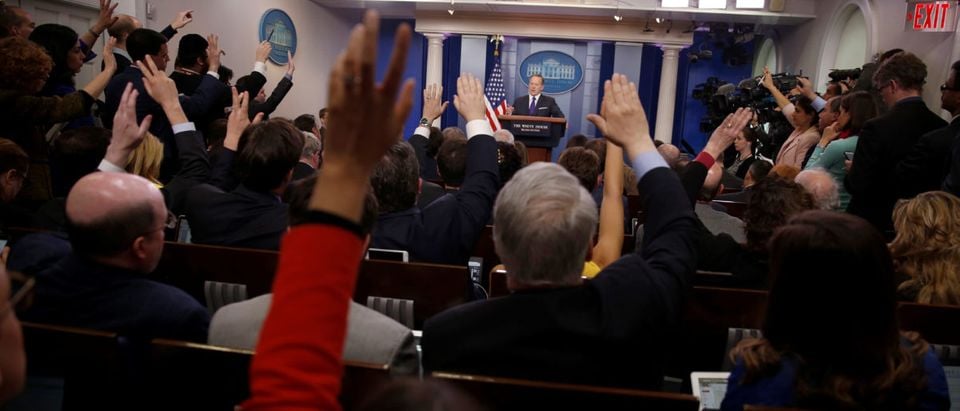One year after WikiLeaks began publishing emails from the Democratic National Committee and Clinton campaign chair John Podesta that exposed prominent journalists as partisans, many of those journalists are continuing their careers without, it seems, any serious consequences.
Take Glenn Thrush, for example. Thrush, now with the New York Times, was exposed sending stories to the Clinton campaign for approval while at Politico.

Glenn Thrush, chief White House political correspondent for the The New York Times, works in the briefing room after being excluded from an off camera “gaggle” meeting at the White House in Washington, U.S., February 24, 2017. REUTERS/Yuri Gripas
“Because I have become a hack I will send u the whole section that pertains to [you],” he wrote in an April 30, 2015 email to Podesta, including five paragraphs from a story later titled “Hillary’s big money dilemma.”
“Please don’t share or tell anyone I did this,” Thrush added. “Tell me if I fucked up anything.”
“No problems here,” Podesta replied.

Glenn Thrush sends a story to the Clinton campaign for approval (Screenshot/WikiLeaks)
On April 17, 2015, Thrush sent an email to Clinton communications director Jennifer Palmieri with the subject line: “pls read asap — the [Jennifer Palmieri] bits — don’t share.”
Palmieri forwarded Thrush’s email to other Clinton campaign staffers, writing: “He did me courtesy of sending what he is going to say about me. Seems fine.”
Thrush’s career doesn’t appear to have been harmed by the fact that he sent stories to Clinton staffers for approval. If anything, his career trajectory has continued upward: Thrush joined the New York Times in December as a White House correspondent.
While covering the Trump administration for the NYT, Thrush has often co-authored stories with fellow White House correspondent Maggie Haberman, whom an internal Clinton campaign memo described as a “friendly journalist.” The memo added: “We have had her tee up stories for us before and have never been disappointed.”
The leaked DNC emails also revealed CNBC editor at large John Harwood as clearly biased against Republicans — especially Trump.
Harwood repeatedly displayed clear partisanship while emailing with Podesta. In one May 2015 email, for example, Harwood warned Podesta to “watch out” for Republican presidential candidate Dr. Ben Carson.
“Ben Carson could give you real trouble in a general,” Harwood wrote, including relevant video clips of Carson on topics including gay marriage.
In December 2015, Harwood claimed “vindication” at the Republican party “veering off the rails.” In the same email, Harwood bragged to Podesta about provoking Trump during a Republican primary debate that Harwood moderated as an ostensibly neutral journalist.
Harwood titled the email, “I imagine…” before continuing in the body: “…that Obama feels some (sad) vindication at this demonstration of his years-long point about the opposition party veering off the rails.
“I certainly am feeling that way with respect to how I questioned Trump at our debate.”

John Harwood emails John Podesta about Republicans “veering off the rails” and brags about provoking Trump. (Screenshot/WikiLeaks)
Harwood was referring to the October 2015 debate he moderated, where he asked Trump if he was running a “comic book version of a presidential campaign.”
Harwood has played a central role in his network’s coverage of the first six months of the Trump White House.
Harwood has — like much of the news media — covered the Russia probe with bombastic language, comparing it to the Watergate scandal that led to Richard Nixon’s resignation.
In a story last week, Harwood lay the blame for Republicans’ health care struggles at Trump’s feet.
New York Times Magazine’s chief political correspondent, Mark Leibovich, gave the Clinton campaign veto power over what parts of an interview he could and couldn’t use, WikiLeaks revealed. (Internal campaign communications described him as “sympathetic.”)
Leibovich emailed Jennifer Palmieri, the campaign’s communications director, following a July 7, 2015 interview with Hillary Clinton. Leibovich told Palmieri she could “veto what you didn’t want,” including parts of the interview that he wanted to use.
Palmieri instructed Leibovich to remove a joke Clinton made about Sarah Palin, as well as Clinton saying that “gay rights has moved much faster than women’s rights or civil rights, which is an interesting phenomenon somebody in the future will unpack.”
Leibovich complied: neither the Palin joke nor Clinton’s “gay rights” line were included in his July 15 feature titled, “Re-Re-Re-Reintroducing Hillary Clinton.”
Leibovich noted in the piece that Clinton’s campaign “at first declined to make her available for an interview.” He did not note that he gave the campaign veto power over what parts of the interview he could use.
Leibovich is still writing long-form pieces for NYT Magazine, which are often met with effusive praise from other journalists on Twitter.
His most recent piece, a July 11 feature titled, “This Town Melts Down,” explored what has and hasn’t changed about D.C. politics in the age of Trump. One thing that apparently hasn’t: the prominence of known partisans in the media.


